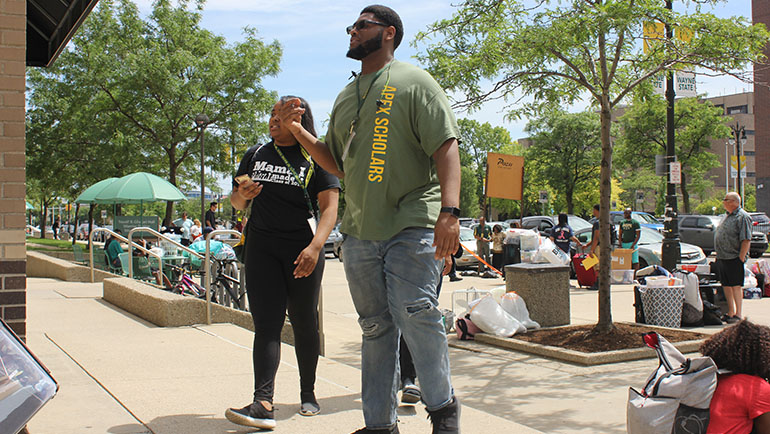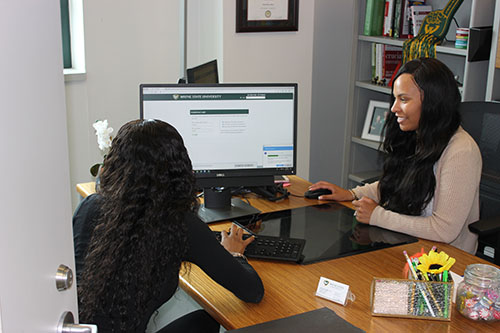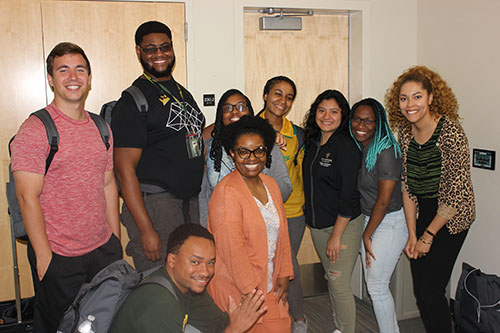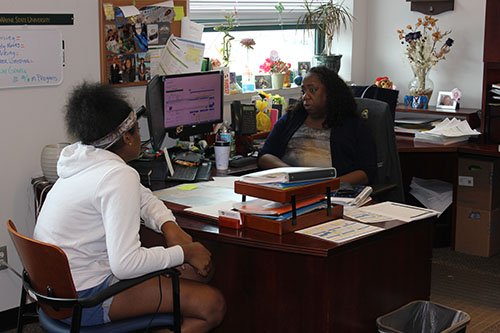
The investment returned.
In 2018, Wayne State University student Damon Creighton Jr. signed up to be a peer mentor for WSU’s Academic Pathways to Excellence (APEX) Scholars initiative and soon began helping his peers cross the same bridge program that helped carry him over as an undergraduate.
As an APEX Scholars student himself the year before, Creighton knew well the impact that the program — with its year-round emphasis on teaching incoming freshmen time management, proper study habits and the importance of academic counseling — had on helping talented high school students overcome academic challenges and successfully transition as full-time Wayne State students. 
“APEX helped get me to the point where I am now,” said Creighton, 22, a graduate of Wyandotte Roosevelt High School who is on track to graduate in May with a bachelor’s in social work. “I was a good student in high school, but I could get good grades on stuff and not put too much effort into it. That wasn’t going to work in college. When I was a freshman, APEX taught me to build a planner and manage my time. It taught me how to be self-motivated and strengthened my time management and study skills.”
And what the program sowed in its students, it has also reaped in the efforts by APEX alumni like Creighton and others to give back to the same initiative that offered them their best chance to succeed in college. Year after year, students who successfully complete the bridge program return to work with the incoming students following in their paths.
“APEX brought me a lot of opportunity, so I want to give back to the new students,” said Melissa Torres, a senior biomedical engineering major from Hillsdale who’s often immersed in her classes. “I’m a mentor for them, a studying tutor. We talk about studying tips, whether they need help with any classes. I’m planning to go back to the office and see if they need any help once I finish my exams.”
Mark Jackson, Ph.D., who has served as director of APEX Scholars since 2014, said a chief reason the program fosters such a strong sense of camaraderie among its participants — and its administrative team — is because it’s designed to underscore students’ potential and to emphasize expectations for success even in the face of academic obstacles.
“Even with Detroit being a melting pot of people of all backgrounds and diverse access to opportunity, Detroit is still a place where there’s limited opportunity,” Jackson explained. “When you’re born and where you’re born, the educational system you come through, and the amount of time your parents can spend with you makes a difference in college readiness — if you’ve got limited access to important college-readiness tools when you start, things don’t have to get better. WSU has made a decision to increase that access. They’ve backed that up with a program that is well-funded and staffed by professionals to ensure that access turns into real opportunity.”
Established in 2012, APEX Scholars is, in its most formal sense, an alternative admissions initiative aimed at providing extracurricular programming that helps students strengthen their cognitive abilities and develop a disciplined approach to learning. Participants are usually drawn from a pool of freshmen university applicants who demonstrate the potential to succeed in college but may lack the academic know-how or rigor to do things like study properly, take good notes and seek academic advisement.
 To be accepted, students must engage in interviews with staff and agree to sign a commitment form that outlines their responsibilities to the program. APEX provides these students with free tuition, books and counseling for the eight-week summer bridge program. Students then spend their first three semesters at Wayne State — their first fall and winter semesters and their second fall semester — under the guidance of APEX.
To be accepted, students must engage in interviews with staff and agree to sign a commitment form that outlines their responsibilities to the program. APEX provides these students with free tuition, books and counseling for the eight-week summer bridge program. Students then spend their first three semesters at Wayne State — their first fall and winter semesters and their second fall semester — under the guidance of APEX.
Once students successfully complete the program, they aren’t required to return to APEX, either to visit or to volunteer. But they almost always do.
“We sometimes get students who don’t feel they need an APEX Scholar — but once they meet us, we discover that we can’t get them to move on from us,” said Audrey Whitfield, associate director of advising and enrollment services for APEX. “Students will come back and say they miss their APEX advisors. As soon as campus opened back up [following the lifting of pandemic-related restrictions], a former student popped up at my door and said, ‘Hi, I miss seeing you, Ms. Whitfield!’ Our students get a sense of belonging. We give that to them from the director on down and support staff on up. There isn’t a person in this department they can’t go to to talk.”
Along with the sense of belonging, students also get a heavy dose of academic discipline. Shardae Bagwell, a 22-year-old WSU senior, credited APEX with teaching her to develop a study routine that allowed her to segue from Harper Woods High School to a major in business management.
“We were required to go to tutoring sessions, to go to APEX meetings, to do study hours,” Bagwell said. “We were also required to do them at the library. We did study hours eight hours a week. We had to constantly meet with our advisors every two weeks so they could let us know where we stood. You learn how to study, when to study. You learn how to seek tutoring. In APEX, you have support.”
And when their time in the program is done, said Bagwell, students have also learned how to reach back to offer the same sort of support they once received. 
“I’ve been working with APEX since 2019,” she said. “I’m a peer mentor. I provide resources that I’ve learned along the way. I’m there to support and guide and help them; I check in with them, see how they’re doing. I let them know things based off my experience. I try to be there and be their support.
“APEX helped me, so I felt like I should help,” Bagwell continued. “They take the time out. Giving my help is my way of saying thank you for everything they’ve done for me.”
